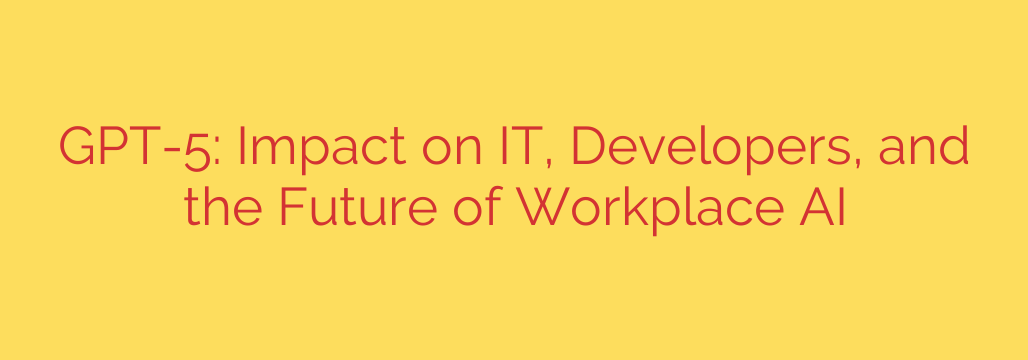
GPT-5 is Coming: How It Will Reshape IT, Development, and the Future of Work
The conversation around artificial intelligence has been dominated by the capabilities of GPT-4, a model that has already transformed how we approach content creation, data analysis, and problem-solving. But as technology barrels forward, the horizon is already showing the next seismic shift: the arrival of GPT-5.
While specifics remain under wraps, the trajectory of AI development points to a model that isn’t just an incremental update. GPT-5 is poised to be a leap forward, introducing capabilities that will fundamentally redefine roles within IT departments, for software developers, and across the entire professional landscape. This isn’t just another tool; it’s the dawn of a new operational paradigm.
What Can We Expect from GPT-5? Beyond Smarter Chat
GPT-5 is anticipated to move beyond advanced text generation into the realm of complex reasoning and autonomous action. Think less of a “copilot” that assists and more of a proactive agent that can independently manage multi-step tasks.
Key advancements will likely include:
- Enhanced Reasoning and Planning: The ability to understand a complex goal, break it down into logical steps, and execute those steps without continuous human prompting.
- True Multimodality: Seamlessly understanding and integrating information from text, images, code, and potentially audio and video to solve a problem.
- The Rise of Autonomous Agents: We are on the cusp of AI agents capable of receiving a high-level objective—like “Optimize our cloud spending”—and independently researching, analyzing data, and implementing changes.
The Transformation of IT Operations
IT departments, the backbone of modern organizations, are on the front lines of this AI revolution. GPT-5 promises to automate and elevate IT functions in ways that were previously the stuff of science fiction.
Proactive Cybersecurity: Instead of just reacting to alerts, an AI-powered system could perform proactive threat hunting, analyzing network traffic for subtle anomalies that signal a sophisticated attack. It could also autonomously patch vulnerabilities as they are discovered, dramatically reducing the window of exposure.
Automated System Administration: Imagine an IT administrator being able to issue a natural language command like, “Set up a new secure development environment for the marketing analytics team with access to these specific databases.” GPT-5 could translate this into the necessary scripts, configure the cloud infrastructure, set permissions, and confirm the deployment—all in a matter of minutes. Routine tasks like ticket resolution, user onboarding, and system diagnostics could become almost entirely automated.
Actionable Security Tip: Businesses must begin establishing strong AI governance and data privacy frameworks now. Determine which data AI models can access and create clear policies for how AI tools are used for security and administrative tasks to prevent misuse and protect sensitive information.
A New Era for Software Development
For developers, GPT-5 won’t be a replacement but a powerful force multiplier that shifts their focus from syntax to strategy. The role of a developer will evolve from a writer of code to an architect of systems.
From Prompt to Production: The current generation of AI can generate code snippets. The next generation will be capable of generating and debugging entire applications based on a detailed prompt. A developer might describe the desired functionality, user interface, and database schema, and the AI will produce a functional, tested, and deployable codebase.
The Focus on High-Level Architecture: With the tedious, boilerplate aspects of coding handled by AI, developers will dedicate more time to what truly matters:
- System design and architecture
- Creative problem-solving
- Ensuring security, scalability, and efficiency
- Reviewing and refining AI-generated code
This shift means the most valuable skill for a developer will no longer be mastery of a specific programming language but the ability to clearly communicate complex requirements to an AI system and critically evaluate its output.
The Future of Work: Autonomous Agents as Teammates
Looking beyond specific roles, the most profound impact of GPT-5 will be the integration of autonomous AI agents into daily workplace workflows. These agents will function like highly efficient, specialized team members.
Consider a project manager asking an AI agent to “Analyze our latest sales data, identify the top three underperforming regions, and draft an initial strategy document outlining potential marketing interventions.” The agent would not only perform these tasks but could also schedule follow-up meetings with relevant stakeholders and prepare a presentation summarizing its findings.
This level of automation will free up human employees to focus on collaboration, strategic thinking, and innovation—the very areas where human ingenuity excels.
How to Prepare for the GPT-5 Revolution
The transition won’t happen overnight, but proactive preparation is essential for any individual or organization wanting to thrive.
For Business Leaders and IT Managers: Start planning now. Develop a robust AI adoption strategy that includes training, security protocols, and ethical guidelines. Identify routine, data-heavy processes that are prime candidates for automation and begin experimenting with current AI tools to build institutional knowledge.
For Developers and IT Professionals: Your value is shifting. Master the art of prompt engineering and learn how to effectively direct and collaborate with AI systems. Deepen your expertise in system architecture, cybersecurity principles, and strategic thinking. Embrace lifelong learning, as the tools and best practices will evolve rapidly.
The impending arrival of GPT-5 signals a critical inflection point. It represents a move from AI as a helpful assistant to AI as a core operational partner. By understanding its potential impact and taking strategic steps to adapt, we can harness this incredible technology to build more efficient, innovative, and ultimately more human-centric workplaces.
Source: https://www.helpnetsecurity.com/2025/08/07/openai-gpt-5-major-changes/








